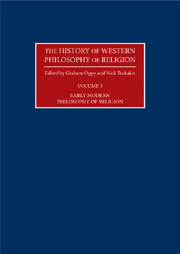Book contents
- Frontmatter
- Contents
- Editorial Introduction
- Contributors
- 1 Early Modern Philosophy of Religion: An Introduction
- 2 Niccolò Machiavelli
- 3 Martin Luther
- 4 John Calvin
- 5 Michel de Montaigne
- 6 Francisco Suárez
- 7 Thomas Hobbes
- 8 René Descartes
- 9 Ralph Cudworth
- 10 Blaise Pascal
- 11 Baruch Spinoza
- 12 John Locke
- 13 Gottfried Wilhelm Leibniz
- 14 George Berkeley
- 15 Voltaire
- 16 The Deists
- 17 Jonathan Edwards
- 18 Thomas Reid
- 19 David Hume
- 20 Denis Diderot
- 21 Immanuel Kant
- 22 Gotthold Ephraim Lessing
- 23 William Paley
- Chronology
- Bibliography
- Index
1 - Early Modern Philosophy of Religion: An Introduction
- Frontmatter
- Contents
- Editorial Introduction
- Contributors
- 1 Early Modern Philosophy of Religion: An Introduction
- 2 Niccolò Machiavelli
- 3 Martin Luther
- 4 John Calvin
- 5 Michel de Montaigne
- 6 Francisco Suárez
- 7 Thomas Hobbes
- 8 René Descartes
- 9 Ralph Cudworth
- 10 Blaise Pascal
- 11 Baruch Spinoza
- 12 John Locke
- 13 Gottfried Wilhelm Leibniz
- 14 George Berkeley
- 15 Voltaire
- 16 The Deists
- 17 Jonathan Edwards
- 18 Thomas Reid
- 19 David Hume
- 20 Denis Diderot
- 21 Immanuel Kant
- 22 Gotthold Ephraim Lessing
- 23 William Paley
- Chronology
- Bibliography
- Index
Summary
The early modern period is one of the richest, perhaps the richest, period in the history of relations between philosophy and religion. The chapters in this volume bear this out again and again, dealing as they do with some of the foremost thinkers of modern times, such as René Descartes, John Locke, David Hume and Immanuel Kant. Each of the following chapters is organized around the contributions of one of these philosophers or a group of philosophers, some of whom lived centuries apart, so it is important at the outset to get a bird's-eye view of the broad contours of the relations between philosophy and religion in the early modern period. This introduction aims to provide just such an overview by taking a thematic approach to the subject.
It goes without saying that Christianity was the dominant religion within Europe throughout the early modern period and almost all of the philosophers and religious thinkers who appear in these pages developed their views in relation to the Christian religion. Even those, such as Baruch Spinoza, who were not nurtured within a Christian community, found that Christian theology and Christian ecclesiastical structures were a dominant force in the polemical context in which they worked. To claim that Christianity was the dominant religion of the period is not, however, to claim that it faced no rivals or internal divisions.
- Type
- Chapter
- Information
- The History of Western Philosophy of Religion , pp. 1 - 18Publisher: Acumen PublishingPrint publication year: 2009

